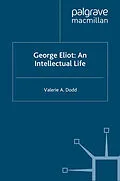There have been several biographies of George Eliot but this is the first study to focus on her intellectual development. The book provides an analysis of the biographical and intellectual factors which encouraged George Eliot to decide upon fiction as her chosen mode of expression, and demonstrates how that decision was influenced by, and an echoing of, J.S.Mill's and Carlyle's critiques of philosophy.
Autorentext
Valerie A. Dodd
Inhalt
Acknowledgements - Introduction - PART 1 THE DEBATE IN ENGLAND - Intuition and Experience - Mill and Carlyle to 1828 - Saint-Simonianism - The Personal Debate - Mill: 1834-June 1837 - Logic and Politics - Mill: July 1837-40 - The Limitations of Logic - Carlyle: 1834-40 - Alternative Revolutions - PART 2 MARIAN EVANS - Marian Evans, 1819-40 - Marian Evans, 1841-43 - Foleshill and Rosehill - Marian Evans, 1844-50 - Forster and Rousseau - Philosophy, Politics and History - Philosophy and the Novel 1844-59 - The Relevance of Ideas: 1844-50 - London: 1851-July 1854 - Dogmatism and Truth: 1851-54 - Lewes to 1850 - Lewes and Marian Evans, 1850-54 - Germany: July 1854-March 1855 - Plans for a Novel: March 1855-December 1856 - Perception and the Medium: The Vindication of Art - Notes - Index
